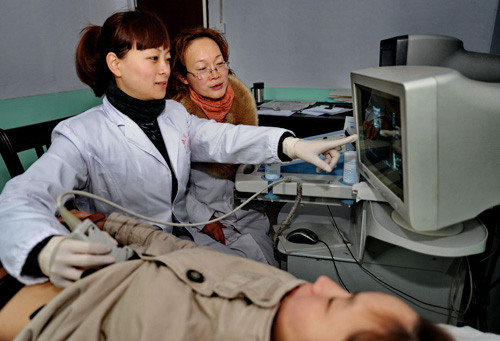|
 |
|
ELITE EXAMINERS: Lu Kejian (left), a sonographer from a hospital in Jian'ou, Fujian Province, gives hands-on training to a colleague at a township hospital (ZHANG GUOJUN) |
More than one year after surviving a traffic accident, 37-year-old Gu Fenli is still going through a slow recovery from traumatic brain injuries at a rehabilitation center. Her speech is only understandable to close family members and her eyes are blank most of the time. However, her husband and father of two Wang Jiangang feels blessed. The farmer from Taicang in east China's Jiangsu Province has been satisfied with the medical care his wife has received and the fact that it is affordable for his family.
The car crash that caused severe brain damage to Gu also left Wang with a broken collarbone. But knowing that his wife's recovery depended on several complicated and expensive brain surgeries, Wang checked himself out of the hospital prematurely to find a job as a driver.
The following three brain surgeries cost a total of 328,500 yuan ($52,100). While the rebate from the state-sponsored social health insurance was 209,000 yuan ($33,200), the family still paid nearly 120,000 yuan ($19,000), an enormous burden to the couple who spent a fortune in treating the kidney illness of their son a few years ago.
One day last December, when Wang was worried about where to get the money for a badly needed surgery to repair his wife's skull, he received a phone call from the local health insurance office. He was informed that his wife was entitled to new insurance reimbursements totaling 79,800 yuan ($12,700).
"This is life-saving money," said Wang. One of China's top specialists in the field successfully performed surgery on Gu, and all she needs for now is recovery.
The pilot program for alleviating financial burdens for people with conditions requiring lengthy and expensive medical treatment, introduced by Taicang in July 2011, has benefited 2,604 people in its first year of operation.
With the absolute majority of China's population covered by the health insurance system, the Central Government is focusing on offering special help to people requiring lengthy and expensive hospitalization.
As a new step to prevent patients from being reduced to poverty by necessary healthcare costs, the Central Government released a plan to increase health insurance rebates for people with critical illnesses under the country's nearly universal health insurance system on August 30.
The fresh systematic arrangement will further increase the level of protection that China's health insurance system can offer, according to an official document co-issued by the National Development and Reform Commission (NDRC) and five other Central Government departments.
Those covered by China's health insurance system will be entitled to reimbursements from the newly launched "major illness scheme" when their annual medical bill exceeds the local annual per-capita net income to ensure that everyone pays less than half of his or her total medical care costs. People don't have to pay extra premiums for the new type of scheme as it will be paid by the balance of current insurance funds.
Sun Zhigang, head of the health reform office under the State Council, China's cabinet, said it aims to ensure that each patient's total medical expenditure is no more than the "catastrophic household expenditure for healthcare."
Though around 1.3 billion people, or more than 95 percent of China's population, have been covered by the health insurance system by the end of last year, medical expenditure burdens incurred by patients with severe medical conditions remain heavy, Sun said.
"The new move targets the widely complained problem of 'people falling into poverty due to illnesses,' and aims to ensure that most people won't be reduced to poverty because of diseases," Sun said.
Local governments have been asked to design regulations on fund raising, reimbursement portions and other details regarding the new insurance scheme in line with local conditions, according to the document.
Qualified commercial insurers will bid to operate the critical illness insurance program, the document said.
Fruitful three years
Responding to the wide public complaints about unaffordable medical care and rural residents' inability to enjoy quality medical services, the Central Government initiated a new round of reforms on China's healthcare system in April 2009, including the goals of establishing a basic social health insurance system, implementing the essential medicine system and improving grassroots medical services.
According to a report submitted by the healthcare reform office under the State Council in June, all goals had been reached on schedule.
Between 2009 and 2011, the Central Government invested 450.6 billion yuan ($71.5 billion) in the country's medical care services. The annual government subsidy for urban and rural residents' insurance was increased from 80 yuan ($12.70) per person in 2008 to 240 yuan ($38.10) in 2012.
| 